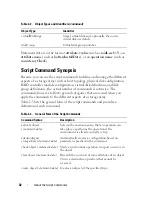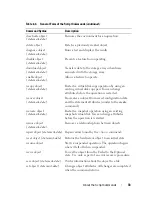
About the Script Commands
29
About the Script Commands
You can use the script commands to configure and manage a storage array.
The script commands are distinct from the command line interface (CLI)
commands; however, you enter the script commands using the command line
interface. You can enter individual script commands, or run a file of script
commands. When entering an individual script command, include it as part
of a CLI command. When running a file of script commands, include the file
name as part of a CLI command. The script commands are processed by a script
engine that performs the following functions:
•
Verifies command syntax
•
Interprets the commands
•
Converts the commands to the appropriate protocol-compliant
commands, which is, in turn, run by the RAID controller module
•
Passes the commands to the storage array
At the storage array, the redundant array of independent disks (RAID)
controller modules in the storage array runs the script commands.
The script engine and script commands support the storage array
configuration and management operations listed in Table 2-1.
Table 2-1.
Configuration and Management Operations
Operation
Activities
Virtual disk, disk group
configuration
Creating, deleting, and setting priority; labeling;
setting physical disk composition when creating
virtual disks; setting segment size; and setting media
scan control
Physical disk configuration
Configuring the hot spare
RAID controller module
configuration
Defining virtual disk ownership, changing mode
settings, defining network settings, and setting host
port IDs
Summary of Contents for PowerVault MD3000i
Page 12: ...12 Contents ...
Page 42: ...42 About the Script Commands ...
Page 90: ...90 Using the Virtual Disk Copy Feature ...
Page 104: ...104 Maintaining a Storage Array ...
Page 222: ...222 Script Commands ...
Page 228: ...228 Sample Script Files ...
Page 236: ...236 Index ...
















































